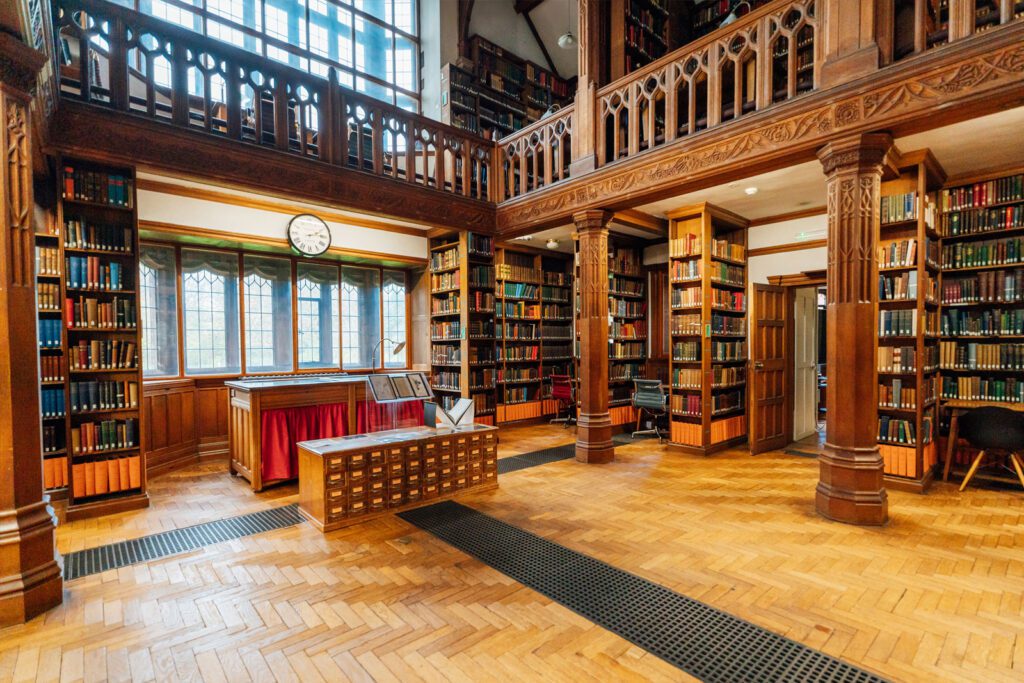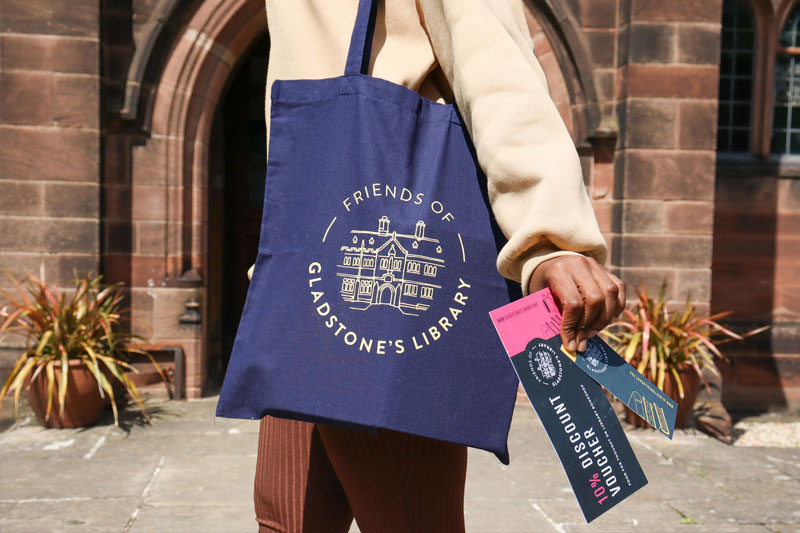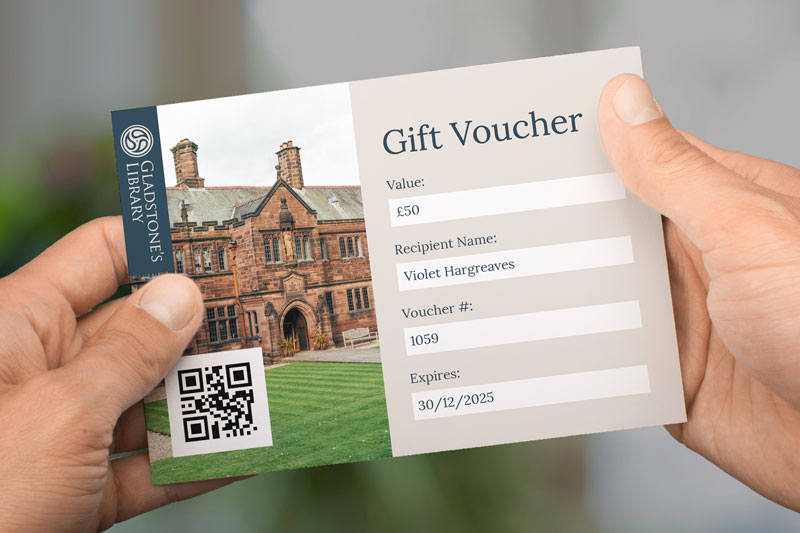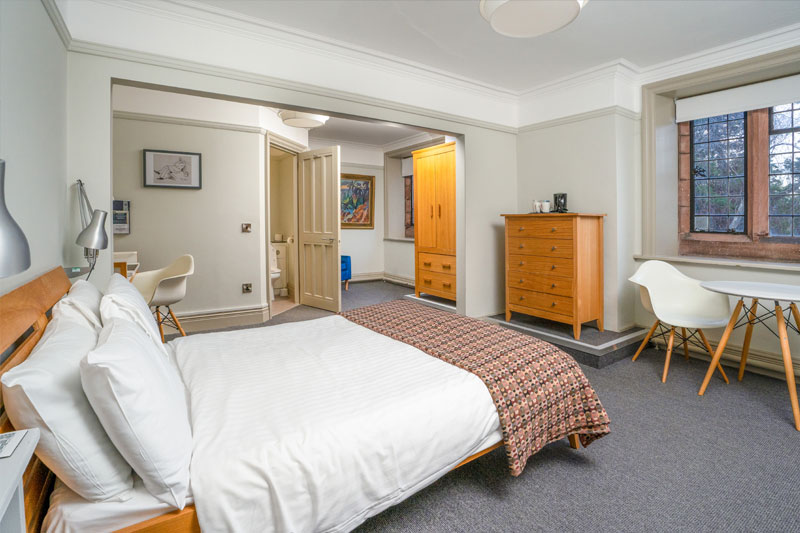When William Gladstone established his library, he wanted to ensure that anyone who would benefit from a residential period of study at Hawarden should not be prevented from doing so by financial constraint.
There are various ways we endeavour to uphold Gladstone’s wishes to keep the library affordable to those who need it most:
- The collection is available via a free-of-charge Reader or Researcher pass
- We offer discounts to students, clergy, and members of the Society of Authors
- We offer residential scholarships each year
- We offer Writers in Residence opportunities
Please see below for full information on how to apply for scholarships and residencies.
Gladstone’s Library is indebted to the generosity of many benefactors who have endowed our Scholarship programme. We hope these scholarships primarily enable those who would find the cost of staying at Gladstone’s Library difficult or prohibitive.
The Jim Cotter Scholarship: For reflection and research (including the use of the Jim Cotter Archive). The scholarships are to be awarded for: broadening the understanding of differing approaches to spirituality; encouraging inclusivity in particular regard to those marginalised by society; and modernising the interpretation of religious materials to improve understanding and relevance. Two-week scholarship.
The Drew Scholarship: In the first instance, for research into aspects of the life, ideas or political/intellectual/spiritual legacy of William Ewart Gladstone. One-week scholarship.
The Jeffrey David Engel Scholarship: Awarded, in the first instance, to scholars from the Diocese of Liverpool studying pastoral care and counselling. One-week scholarship.
The General Scholarship Fund: Awarded to applicants responding to a theme, which is set annually by the Library’s Warden. One-week scholarship.
The Gladstone Scholarship: For scholars from Bulgaria or Armenia, or of Bulgarian or Armenian heritage. One-week scholarship.
The Richard L. Hills Scholarship: For research into Theology’s relationship to Science/Technology. One-week scholarship.
The Tom Jarman Scholarship: In the first instance, for students and graduates of Bristol University, Wesley College Bristol, Bristol Baptist College and students of the Open University. One-week scholarship.
The Clara Joseph-Shievietz Memorial Scholarship: Awarded to support those who are working on projects related to Jewish history and culture, particularly those whose projects will benefit from a period of reflective work rather than initial research with the collections. Although applicants are not required to include any kind of output in their application, if an output is included it should be non-fiction in nature. One-week scholarship.
The Miranda Kaufmann Black British History Scholarship: For research into the histories of people of African and/or Caribbean origin or descent in the United Kingdom, making connections between the local and global aspects of British History. Please note, this scholarship is available exclusively for people who are United Kingdom Minority Ethnic/Global Majority Heritage. Two-week scholarship, including travel expenses of up to £150.
The Revd Canon Dr Stewart Lawton Memorial Scholarship: Awarded for research into one of the following areas: The Liberal Catholic Tradition in Anglicanism; the Interaction of Science and Religion or and European Philosophical Theology. One-week scholarship.
The Revd Dr Murray McGregor Memorial Scholarship: Awarded to those working on any aspect of Theology. First consideration will be given to applications from graduates, post-graduate students and members of the academic staff of the University of Edinburgh and thereafter from other Scottish universities. Two-week scholarship.
The Bishop J. R. H. Moorman Scholarship: Intended primarily for those researching Francis of Assisi or the Franciscan Order, where access to the Moorman Franciscan Collection would prove beneficial. One-week scholarship.
The Veronica Powles Memorial Scholarship: For either members of the Mothers’ Union or for study and research into women’s ministry and issues. One-week scholarship.
The Sara Richards and Joseph Boughey Scholarship: Awarded for research into the past, present and future of libraries, reading and archives, with particular reference to material facilities such as collections or library buildings. A wide range of possible subjects and approaches is encouraged. In the first instance, the scholarship is intended for end-users of libraries or archives, rather than employees. Preference will be given to those working on their first output and/or publication, and those resident in North Wales (Flintshire, Denbighshire, Wrexham, Conwy, Gwynedd, Ynys Môn), the Liverpool City Region, Cheshire West and Chester, Warrington, Greater Manchester or West Yorkshire. One-week scholarship.
The Dr Daisy Ronco Scholarship: For research into Nineteenth Century Studies with an emphasis on the role of women. One-week scholarship.
The Canon Denys Ruddy Memorial Scholarship: For study in Theology, Liturgy, Spirituality, or Christianity and The Arts. One-week scholarship.
The Eileen Stamper Scholarship: For research and study in to historical or contemporary slavery. Two-week scholarship.
The Vera Stantan Scholarship: For research into the ecumenical movement or interfaith dialogue. One-week scholarship.
The Canon Symonds Memorial Scholarship: For those studying in the fields of Christian Liturgy, Biblical Studies or Church History. One-week scholarship.
The Father John Thorold Scholarship: For study in spirituality or liturgy. One-week scholarship.
The Ernest Walder Memorial Scholarship: For research in the Arts and Humanities. One-week scholarship.
Please note that the submission period for scholarships to be taken in 2026 has not yet opened.
The submission period for scholarships to be taken in 2026 will open from 9am BST on Monday 2nd June 2025, with a deadline of 11.45pm BST on Thursday 31st July 2025. The Gladstone’s Library team will review all scholarship applications throughout August, September and October, and will aim to let everyone know by Monday 3rd November 2025. All scholarship applications must be submitted via our online form in the link above (please note this only goes live from 9am on Monday 2nd June 2025).
The scholarships have been given by the benefactors to ensure that research into the subjects important to them will be supported by the Library in perpetuity. If a suitable applicant is not found for a specific scholarship, the award will be held over until the following year.
Applications outside of the specified subject areas will not be considered.
Please read the following Terms and Conditions carefully:
For any enquiries regarding our Scholarship Programme please contact: [email protected]
- How to Apply: Applications must be made via the online form, found by clicking the link at the top of the page. All queries and questions should be directed to [email protected], with ‘Scholarships 2026’ in the subject field.
- Maximum Applications: Each applicant may apply for a maximum of two scholarships. Only one scholarship will be awarded per applicant.
- Judging: Scholarships are awarded by an internal panel, drawn from Gladstone’s Library’s academic and professional staff. There will be a minimum of two individuals on the panel, one of which will always be the Library’s Warden unless exceptional inability to fulfil that criteria means that scholarships would not be awarded.
- Feedback on Application: With an average of two hundred applications received, we cannot comment on individual applications.
- Length of Award: Scholarships are awarded according to each scholarship’s stipulations. A two-week award may be split if there is a very strong field.
- Accommodation: All scholarships are awarded a single ensuite room. Only two rooms at the Library are on the ground floor, with the rest on the first and second floors. Applicants should detail room requirements in their application.
- Collection Use: Although most of our collections are housed on open-access shelving, access to archives and special collections must be booked well in advance of your scholarship. Please see the relevant webpages or contact [email protected] for information.
- Travel: The majority of our scholarships do not make provision for travel and applicants should ensure that they have a reasonable idea of likely expenses before applying.
- Partners: Partners are welcome to stay at the same time and in the same room as the scholarship holder but will be charged a rate of £50 per night for bed and breakfast, with all other meals paid for separately. We will need to be informed of partners at the time of booking the scholarship award.
- Charges during your stay: As well as the room, the residency rate covers the following costs: Continental breakfast, two-course lunch, two-course evening meal (both with tea and filter coffee). All other refreshments are chargeable, and the bill settled on departure.
- Accepting an offer: if you receive a scholarship offer from Gladstone’s Library, you must have agreed and booked the dates of your stay within six weeks of the offer. We understand that in certain circumstances this may not be possible and extensions can be made, but if a scholarship has not been finalised by March of the year following the offer, the scholarship will be withdrawn.
- Post-scholarship commitments: We will be in touch during and after your visit to discuss how you may like to reflect on your stay with us.
- GDPR: All entries are kept until all scholarships have been awarded and accepted.
Gladstone’s Library’s competitive Writer in Residence programme provides space and resources for up to four writers whose work engages with liberal values. By liberal values, we do not mean views aligned with any one political ideology, but rather:
-
- a commitment to freedom and social justice;
-
- tolerance and respect of difference;
-
- open-mindedness coupled with intellectual curiosity;
-
- generosity of spirit and a willingness to learn from others.
Founded by William Ewart Gladstone in the 1880s, the Library is committed to maintaining his legacy of engagement with social, moral and ethical questions. We don’t claim to provide the answers but we do offer a comfortable, sociable and stimulating environment where answers may be found. Our Reading Rooms offer unparalleled resources for creative study, including renowned collections of historical, cultural, theological and political materials; several thousand books came from Gladstone’s own library, many containing annotations made by Gladstone himself. We know from his diaries that Gladstone read on average five books a week – any applicants can be sure that our collections have something to offer them.
The connections Gladstone made between the various disciplines he collected helped shape his form of liberalism. Through reflection and writing during their stay, Writers in Residence help us redefine liberal values for the twenty-first century. Their engagement might be critical, supportive or merely observant. Gladstone was a polymath with interests ranging widely across religion, history, social justice and politics from Classical times to what was, for him, contemporary culture. The scope of these four residencies is equally wide and we welcome fiction and non-fiction writers.
Gladstone’s Library is unique. It is the only residential library in the United Kingdom. It provides a meeting place dedicated to dialogue, debate and learning for open-minded individuals. The Residency programme is designed to share the Library’s benefits with as many people as we can, broadening the Library’s audience and benefiting from their perspectives in turn. The Library welcomes all, regardless of gender, race, class, sexual orientation or religious affiliation. All Writers in Residence will be at ease with this inclusive ethos.
Up to four places are awarded to writers working in the English language. We like to support writers as best we can, and we know that many cannot simply abscond from regular life for a month. Residencies can therefore be taken in two two-week blocks, and residencies of a single fortnight will also be considered. We are also flexible with dates. Please indicate the length and suggested date of Residency on your application.
Writers at all stages of their career should feel able to apply for a residency. We are proud to say that Residencies have supported some of the finest writers in the English language, whether they won for their tenth book or their very first.
Each residency includes:
- Accommodation in an ensuite room for a period of four consecutive weeks;
- All meals (breakfast, lunch and dinner);
- Travel expenses to and from the Library at the start and end of the residency (HMRC mileage allowance or standard bus/train fares within the UK, capped to a limit of £250);
- An honorarium of £100.00 per week.
Each winning author must:
- Attend the official prizewinning ceremony in London (in 2025 this may be online or in at the Library itself, TBC);
- Participate, where possible, in any other publicity events held before or after their residency;
- Respond to media/press enquiries as appropriate and by prior agreement with the Library’s Warden, Andrea Russell;
- Submit two blog posts to the Gladstone’s Library website;
- Lead a creative writing workshop to not more than twenty participants;
- Give an evening talk about any aspect of their writing and/or creative life;
- Abide by the normal terms and conditions for guests staying at Gladstone’s Library.
Please note that the submission period for Writer in Residence 2026 has now closed.
The submission window for Writer in Residence 2026 opened at 10am on Monday 17th February 2025 and remained open until 11.45pm GMT on Friday 7th March 2025. Please see below for the full Terms and Conditions.
The shortlist will be announced on Monday 26th May, with the winners announced on Monday 8th September 2025.
Please read the following Terms and Conditions carefully:
Please note that all applications should be submitted via our online form. If your work has not yet been published you may submit a manuscript via email at the same time. If your book has been published, please send one hard copy of that book via post to Gladstone’s Library (see point 7, below).
Along with a single copy of a work published in the last three years (see ‘Eligible texts’, below), entrants must submit via our online form including:
- the title of the work that you are submitting for consideration;
- a one-page CV;
- a 250-word biography;
- a statement about your take on (re)defining ‘liberal values’ (up to 250 words);
- a statement on the work that you plan to do at the Library (up to 250 words);
- a proposal for an evening event and day masterclass (up to 250 words each);
- the length and suggested dates of your residency;
- Please note that we can only accept manuscript titles via email as explained on our online form (see T&C 7 and 8). All other titles must be submitted by post.
- Eligible texts: Books must be published in the UK. Submitted texts must have been published for the first time in the last three years (2022-2024) or be forthcoming (2025-26). Prose fiction and non-fiction, poetry, screenplays and drama are all eligible for submission. The Residency programme will consider unpublished scripts if submitted with evidence of performance.
- Manuscript submissions: We accept manuscript submissions accompanied by evidence of a contract and publishing schedule. Preference will be given to books due to be published during the relevant year of residency. Only manuscript submissions can be submitted via email (see 7 and 8).
- Authors: Authors may be based anywhere in the world but due to the nature of the residency programme activities, applicants should be able to communicate fluently in English.
- Non-eligible texts: Self-published authors are not eligible for Writer-in-Residence but are supported through other Library programmes. See this page for details.
- Shared residency: The programme has permitted two writers to split a month’s residency. Shared residency submissions should be submitted in the form of ONE application made by both writers.
- Schedule: Judging takes place in August, and winners will be notified by the end of August. The official announcement is made in early September. All winners are invited to a launch event (likely taking place in November/December).
- Entry regulations: Winners agree to take part in publicity activity and abide by Library rules during tenure. Entry is free and limited to one entry per author. You cannot enter under a pseudonym. Due to volume of entries, we will confirm your submission, but detailed correspondence or feedback cannot be offered.
- Postal address: Submissions should be sent to Writer in Residence 2026, Gladstone’s Library, Church Lane, Hawarden, Flintshire CH5 3DF.
- Email: Only manuscript entries can be submitted via email, clearly marked ‘Writer in Residence 2026’. Hard copy books should be posted. All applications should be made via our online form.
- Queries: Queries should be directed to [email protected] only, clearly marked ‘Writer in Residence 2026’. Emails to other addresses will not be redirected.
- GDPR: Submissions will be kept for fourteen months from date of submission.



